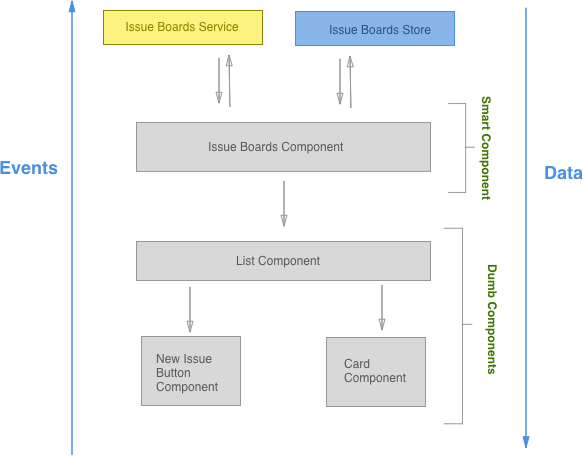4.9 KiB
Frontend Development Guidelines
This document describes various guidelines to ensure consistency and quality across GitLab's frontend team.
Overview
GitLab is built on top of Ruby on Rails using Haml with Hamlit. Be wary of the limitations that come with using Hamlit. We also use SCSS and plain JavaScript with modern ECMAScript standards supported through Babel and ES module support through webpack.
We also utilize webpack to handle the bundling, minification, and compression of our assets.
Working with our frontend assets requires Node (v4.3 or greater) and Yarn (v0.17 or greater). You can find information on how to install these on our installation guide.
jQuery is used throughout the application's JavaScript, with Vue.js for particularly advanced, dynamic elements.
Browser Support
For our currently-supported browsers, see our requirements.
Development Process
When you are assigned an issue please follow the next steps:
Divide a big feature into small Merge Requests
- Big Merge Request are painful to review. In order to make this process easier we must break a big feature into smaller ones and create a Merge Request for each step.
- First step is to create a branch from
master, let's call itnew-feature. This branch will be the recipient of all the smaller Merge Requests. Only this one will be merged to master. - Don't do any work on this one, let's keep it synced with master.
- Create a new branch from
new-feature, let's call itnew-feature-step-1. We advise you to clearly identify which step the branch represents. - Do the first part of the modifications in this branch. The target branch of this Merge Request
should be
new-feature. - Once
new-feature-step-1gets merged intonew-featurewe can continue our work. Create a new branch fromnew-feature, let's call itnew-feature-step-2and repeat the process done before.
* master
|\
| * new-feature
| |\
| | * new-feature-step-1
| |\
| | * new-feature-step-2
| |\
| | * new-feature-step-3
Tips
- Make sure
new-featurebranch is always synced withmaster: merge master frequently. - Do the same for the feature branch you have opened. This can be accomplished by merging
masterintonew-featureandnew-featureintonew-feature-step-* - Avoid rewriting history.
Share your work early
- Before writing code guarantee your vision of the architecture is aligned with GitLab's architecture.
- Add a diagram to the issue and ask a Frontend Architecture about it.
- Don't take more than one week between starting work on a feature and sharing a Merge Request with a reviewer or a maintainer.
Vue features
- Follow the steps in Vue.js Best Practices
- Follow the style guide.
- Only a handful of people are allowed to merge Vue related features. Reach out to one of Vue experts early in this process.
Architecture
How we go about making fundamental design decisions in GitLab's frontend team or make changes to our frontend development guidelines.
Testing
How we write frontend tests, run the GitLab test suite, and debug test related issues.
Design Patterns
Common JavaScript design patterns in GitLab's codebase.
Vue.js Best Practices
Vue specific design patterns and practices.
Style Guides
JavaScript Style Guide
We use eslint to enforce our JavaScript style guides. Our guide is based on the excellent Airbnb style guide with a few small changes.
SCSS Style Guide
Our SCSS conventions which are enforced through scss-lint.
Performance
Best practices for monitoring and maximizing frontend performance.
Security
Frontend security practices.
Accessibility
Our accessibility standards and resources.
DropLab
Our internal DropLab dropdown library.
